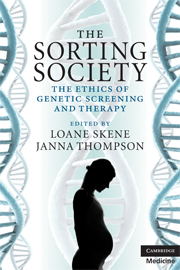Book contents
- Frontmatter
- Contents
- List of contributors
- Preface
- 1 Introduction
- 2 Genetic testing, an informed choice
- 3 Sex selection: sorting sperm as a gateway to the sorting society?
- 4 Cloning to avoid genetic disease
- 5 Procreative Beneficence: reasons to not have disabled children
- 6 Reprogenetic technologies: balancing parental procreative autonomy and social equity and justice
- 7 Genetic technology and intergenerational justice
- 8 Genetic preselection and the moral equality of individuals
- 9 Genes, identity and the ‘expressivist critique’
- 10 Overstating the biological: geneticism and essentialism in social cloning and social sex selection
- 11 The sorting society: a legal perspective
- Index
11 - The sorting society: a legal perspective
Published online by Cambridge University Press: 16 September 2009
- Frontmatter
- Contents
- List of contributors
- Preface
- 1 Introduction
- 2 Genetic testing, an informed choice
- 3 Sex selection: sorting sperm as a gateway to the sorting society?
- 4 Cloning to avoid genetic disease
- 5 Procreative Beneficence: reasons to not have disabled children
- 6 Reprogenetic technologies: balancing parental procreative autonomy and social equity and justice
- 7 Genetic technology and intergenerational justice
- 8 Genetic preselection and the moral equality of individuals
- 9 Genes, identity and the ‘expressivist critique’
- 10 Overstating the biological: geneticism and essentialism in social cloning and social sex selection
- 11 The sorting society: a legal perspective
- Index
Summary
Many concerns have been expressed about the long-term implications of allowing women to have pre-implantation or prenatal genetic diagnostic tests for their fetus or embryo and the potential medical interventions that may follow from such tests. These interventions include implantation of only ‘unaffected’ embryos; sex selection; termination of pregnancy if a fetus is found to be affected; pre-implantation or prenatal ‘gene therapy’; and even cloning an embryo to avoid mitochondrial genetic disease, which is not avoidable by prenatal testing.
There are concerns about ‘playing God’, ‘designer babies’ and judging the ‘value’ of a baby who is chromosomally or physically abnormal. There are fears about genetic determinism. If genetic testing becomes routine, will undue weight be placed on genetic factors in assessing people's potential achievements, so that those with particular genetic traits suffer unfair discrimination? If it is possible to avoid the birth of children with genetic disorders, will pregnant women feel compelled to agree to tests, or even be penalized if they refuse and have a disabled child, for example, by having to pay higher health insurance premiums? Will the community's sympathy for people with disabilities be reduced as fewer babies are born with congenital disabilities? There are also social justice issues. Who will fund routine genetic tests? If women must pay for the tests themselves, what are the implications for equity? Could genetic tests lead to a society of ‘unequals’?
On the other hand, there are many arguments in favour of pre-implantation and prenatal genetic testing.
- Type
- Chapter
- Information
- The Sorting SocietyThe Ethics of Genetic Screening and Therapy, pp. 149 - 158Publisher: Cambridge University PressPrint publication year: 2008

